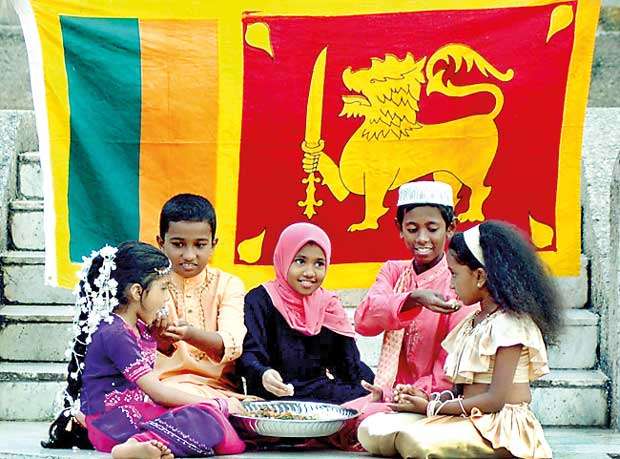A Brief Colonial History Of Ceylon(SriLanka)
Sri Lanka: One Island Two Nations
A Brief Colonial History Of Ceylon(SriLanka)
Sri Lanka: One Island Two Nations
(Full Story)
Search This Blog
Back to 500BC.
==========================
Thiranjala Weerasinghe sj.- One Island Two Nations
?????????????????????????????????????????????????Friday, July 13, 2018
On urban centres and suburban peripheries

Worldview and outlook are informed by a mindset which is as hegemonic and as imposing as the worldview and outlook they condemn
The “NGO intelligentsia” bloomed after the Premadasa presidency. They had their moment during the Chandrika Bandaranaike days
The fight against racism need not be opposed to the resolution of economic issues
Certain intellectuals love to wax eloquent on “alternative narratives”
and not always for innocent reasons. In Sri Lanka, for these ladies and
gentlemen, the prevailing narrative is informed by a Sinhala Buddhist
mindset. An alternative to this narrative would be one, I suppose,
informed by a non Sinhala Buddhist mindset. Or a mindset which somehow
brings together Sinhala Buddhists and non Sinhala Buddhists. I wouldn’t
know. They haven’t done a good job identifying and explaining this to us
so far. And insofar as the people of this country, with fuel prices,
inflation, rising costs of living, and prospects of unemployment lying
just around the corner, are concerned, I wouldn’t care and neither would
you.

The dominant discourse is that Sinhala Buddhists are hegemonic monsters who like to summon Hitler in order to solve the country’s problems. The dominant discourse is that when it comes to sharing power between the centre and the periphery, the Sinhala Buddhists have resisted compromise and resolution at every step of the way. The dominant discourse is that the country’s problems, throughout much of history, can be traced to the same people who happen to form the numerical majority in the population. Be it in politics and even in the arts, the role of civil society is therefore to take us away from this Sinhala and Buddhist centric perspective, as a means of emancipating the nation.
Those who project and perpetuate this discourse are professionals at inferring problems, but weak on extracting conclusions. But I presume that’s to be expected, given that the problems themselves are couched in terms which go directly into their way of thinking and looking at the world. That worldview and outlook are informed by a mindset which is as hegemonic and as imposing as the worldview and outlook they condemn. No, this is not to belittle their concerns, much of which do certainly ring alarm bells, rather to point out that intellectuals who keep on talking about narratives and hegemonies have failed so far to reconcile the ideological, the abstract, with the material, the concrete. They talk of democracy, of fairness, of the need to do away with structures of power and force, yet they do not talk about or even dwell on the economic imperatives needed to facilitate such concepts. They talk of equity from one side of the room, forgetting that on the other side we are being squeezed by the IMF (in the name of growth) to revise price structures which happen to be felt most acutely by the poor.

Combating hegemonic structures, I have always felt, boils down to perspective. What hegemony? Sinhala Buddhist? Eelamist? At one point the latter was more powerful than the former and yet those same intellectuals talked about bringing both to the negotiating table. If that was their logic then, isn’t it strange, now that Eelamism on no longer the dominant discourse it was, that they are asking for the annihilation of the Sinhala Buddhist hegemony? If they asked for a round table before, why are they asking for a square one now?
By concentrating on the ideological and the abstract, the intellectuals have succeeded in alienating a vast majority of people whose knowledge of democracy, hegemony, and all those other suffixed concepts and abstractions is next to zero, not because they aren’t aware of them but because diminishing economic prospects have compelled them to forget them. We happen to be living in a world where the West talks about democracy and economic restructuring at the same time. It’s Orwell’s double-think, though in a more insidious form. People are being preached about equity and justice one week and the following week, they see their belts being tightened and squeezed beyond endurance. Neither the government nor civil society has done a good job of reconciling these two ends of the same stick.
The “NGO intelligentsia” bloomed after the Premadasa presidency. They had their moment during the Chandrika Bandaranaike days and they flirted with politicians who readily gave into and perpetuated their myths. Some of those politicians have found their place in the sun in the present government and this intelligentsia is having a field day all over again. That is why they continue to sustain, unwittingly, a rift between what they preach and what the rest of the political and economic centre practise. The concrete realities that we encounter day in and day out are as far away from all those ideological alternative narratives as they were before. I’m willing to wager that with what we are facing today (mounting debt, never-ending price hikes, unemployment, strikes that attest to policy anomalies in the public sector), this rift is even bigger than what it used to be once.
Such a rift is counterproductive to both the country and those inadvertently sustaining that rift. The biggest failing of civil society has been its lack of contact with the grassroots. The image of civil society as being housed by English-speaking writers and academics residing in comfortable air-conditioned houses is largely a myth borne out of the popular culture (Sarath Weerasekara’s film Gamini perpetuated this myth). While the federalist discourse traces its origins to an English speaking intelligentsia, the descendants of this intelligentsia have tended to come from a largely bilingual or monolingual (mainly Sinhala) backdrop. They have succeeded in translating the sacred abstractions to their tongue. But even these translations have not had an impact on the majority. While clearly reflected and refracted through Sinhala, they have not swept into the Sinhala heartland. They remain limited to the urban centre and suburban periphery.
Here lies the main flaw at the heart of the NGO intelligentsia: they continue to be led by foreign experts and ideologues who themselves are losing ground in a West where right-wing oppositions and governments have made a mockery of those structures of good governance and democracy and decency which continue to be venerated here by these very same experts and ideologues. How can the NGO intelligentsia ever curry favour with the population?
I firmly believe that the fight against racism need not be opposed to the resolution of economic issues. Anti-racism need not be anti-Sinhala Buddhist or, worse, Eelamist, and the same room can hold devolutionists and nationalists and this to the exclusion of those who are baying for blood over their demands for complete, unconditional federalism and separatism. (To a considerable extent, this is true of the Podujana Peramuna, which houses both Dinesh Gunawardena and Vasudeva Nanayakkara.
That, however, is a fragile marriage of convenience, a momentary political truce in fact, and should the SLPP win in 2020, it may well crack up thanks to those inevitable ideological disputes which led to the Samasamajists to divide during the Mahinda Rajapaksa regime.) I also firmly believe that much of the history that paints the Sinhala Buddhists as demons and fascists, which has been roundly proven to be biased (though I cannot claim to be a scholar the way the writers of these anti-Sinhala Buddhists histories are, I believe I and other non-historians have succeeded in calling them out for the hollowness of their writings), can be discarded in favour of a history that is more sympathetic, more inclusive, more comprehensive, with respect to all ethnicities. And that, ladies and gentlemen, is the real alternative narrative we should look at. Not the one we’ve been forced to concede ground to.


